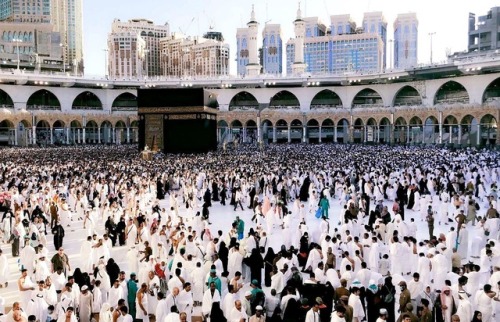Jaliyat al Akdar wal-Sayful Battar Bil-Salat `ala al-Nabi al-Mukhtar (The Remover of Harms and Trenchant Sword by Invoking Blessings on the Chosen Prophet Muhammad) is a major supplication in Arabic by the polyglot Grandmaster of the Naqshbandi Tariqa from Shahrazur (Iraqi Kurdistan), Mawlana Khalid al-Baghdadi (1190-1242/1776-1827) through the 99 Divine Names, the Great Invocations of Blessings on the Prophet through his Names and Attributes, and the Names of the 313 Companions of the Great Battle of Badr (Ramadan 2/March 624) recited in full by Gibril Fouad Haddad as ordered by Qutb al-Mutasarrif and the Grandmaster of the Naqshbandi Sufi Way, Mawlana Shaykh Hisham Kabbani (b. 1364/1945) and with his isnad (chain of transmission, see below) to Mawlana Khalid, on 17 Ramadan 1441/11 May 2020.
The full PDF of the typeset Arabic text of the supplication can be downloaded here. It is read here in the 1411/1991 Ihlas Wakfi offset edition of its original calligraphied Turkish print. Shaykh Gibril apologizes for his errors in recitation.
Mawlana Khalid al-Baghdadi died of the plague in Damascus in his early fifties along with his foremost student and immediate appointed successor Shaykh Isma`il al-Anarani who died 16 days after him and was buried next to him, and some relatives of Mawlana Shaykh Khalid — also buried nearby — on the top of the holy Mount Qasyoun in Damascus, referred to in the Qur’an as “The Fig” in the Sura of the same name. Mawlana Khalid had supplicated Allah to remove the plague from the people of Damascus and put it in him instead, and his prayer was answered.
Muhammad Amin Ibn `Abidin the arch-jurist of Damascus saw himself in dream praying the funeral prayer over our liege-lord the Rightly-Guided Caliph `Uthman b. `Affan (Allah be well-pleased with him) and mentioned it to his teacher, Mawlana Shaykh Khalid. The latter said: “The dream you saw represents me, as Sayyidina `Uthman is my ancestor. You shall pray the funeral prayer over me.” And this took place not long afterwards.
The recitation of the names of the Companions of Badr carries immense blessing and constitutes one of the most powerful intercessory prayers to Allah which the Ummah has practiced in times of calamities, plague and pestilence and also as a means of victory over enemies. It is most effective as a remedy against the harm of one’s own rebellious soul, which is each person’s ultimate arch-enemy. It is read on 17 Ramadan, the day of the anniversary of the Battle of Badr which represents the triumph of belief over unbelief. This anniversary coincides with the traditional celebration of the Descent of the Qur’an (Nuzul al-Qur’an) in one block to the nearest heaven, of which the spiritual culmination takes place on the Night of Power (Laylat al-Qadr) on 27 Ramadan.
It is for such events, among other blessings, that the month of Ramadan has been called the Month of Allah and also the Month of the Ummah, i.e. the time when all post-Prophetic humanity enjoys the holiest of its states on earth despite our difficulties and shortcomings.
بسم الله الرحمن الرحيم
أنبأني سيدي ومولاي القطب المتصرِّف مولانا الشيخ محمد هشام قبّاني بن الحاج محمد سليم قباني الحسيني النقشبندي الحقاني اللبناني الشافعي (ولد يوم الأحد 14 صفر 1364/28 كانون الثاني يناير 1945) حفظه الله تعالى وسيدي سلطان الأولياء الشيخ محمد ناظم الحقاني (1341-1435) رحمه الله تعالى،
قال الأول: عن سيدي سلطان الأولياء الشيخ محمد ناظم عادل القبرصي الحقاني وسيدي سلطان الأولياء، واعظ الأمة مولانا الشيخ عبدالله فائز بن الحاج حسين بن الحاج عبد الله الداغستاني (1294-1393) رحمهما الله تعالى،
وقال الثاني: عن سيدي سلطان الأولياء، واعظ الأمة مولانا الشيخ عبدالله فائز الداغستاني،
عن شيخه الشيخ شرف الدين زين العابدين الداغستاني الرَّشادي (ت 1354)،
عن خاله الشيخ أبي محمد المدني الداغستاني الرَّشادي القادري (ت ؟)،
عن الشيخ أبي أحمد حاج عبد الرحمن أفندي الداغستاني الثُّغُري (ت 1299)،
عن الشيخ السيد جمال الدين أفندي الغازي الغُموقي الحسيني القادري (ت 1292) – وكان يذكر جهراً،
كلاهما عن الشيخ محمد أفندي بن إسحاق اليَراغي الكَورالي (ت 1260)،
عن خاص محمد أفندي الشِّيرْواني الداغستاني (ت 1254)،
كلاهما عن الشيخ ضياء الدين إسماعيل أفندي ذبيح الله القَفْقازي الشِّيرْواني الكُرْدامِيري الداغستاني (ت ؟)،
عن الشيخ إسماعيل الأناراني (ت 1242) – الذي سمعت مولانا الشيخ ناظم يروي عن مولانا الشيخ خالد فيه: سيجلس الشيخ إسماعيل الأناراني على سجادتي ومن بايعه فقد بايعني، لكن انتقل بعد الشيخ خالد بقليل، قيل 16 يوما (ثم انظر نعته في (الحدائق الوردية) للشيخ عبد المجيد الخاني)،
كلاهما ـ الكُرْدامِيري والأناراني ـ عن مولانا الشيخ ضياء الدين خالد ذي الجَناحين أحمد بن حسين الشَّهْرَزوري السُليماني البغدادي ثم الدمشقي النقشبندي العثماني (1190 أو 1193-1242) — وكان يوقّع بتوقيع (أضعف العباد خالد النقشبندي المجددي القادري السهروردي الكبروي اﻟﭽﺸﺘﻲ)، قال: جَالِيَةُ الأَكْدَار وَالسَّيْفُ البَتَّار بِالصَّلاةِ عَلَى النبيِّ المُخْتَار صلَّى اللهُ عَلَيْهِ وَآلِهِ وَصَحْبِهِ وَسَلَّم.



